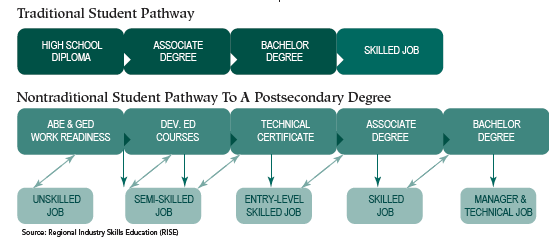The Road to a Postsecondary Degree for Nontraditional Students
October 20th, 2010
A recent post shows many of Mississippi’s fastest-growing occupations with quality wages now require postsecondary credentials. Examples include registered nurses, software engineers, and computer support specialists.
As Mississippi seeks to connect adults with postsecondary credentials to attain these jobs, the state will need to enhance its efforts to support the state’s nontraditional students.
Nontraditional students have at least one of the following characteristics. They are 19+ years old, work full-time, have dependents, are financially independent, and/or attend classes part-time.
Nontraditional students often take a less direct pathway to a postsecondary degree than traditional students. The figure below compares the pathways of traditional and nontraditional students. The nontraditional student has more potential gaps in their pathway to a postsecondary degree and may alternate between work and school as they build toward a final credential.
Click to enlarge
Acronyms Defined: ABE – Adult Basic Education; GED – General Educational Development indicates High School Equivalency
Source: Regional Industry Skills Education (RISE) Initiative
Supporting Mississippi’s Nontraditional Students
Working adults and parents need course schedules that allow students to balance work, school, and family. Courses offered on the weekends, evenings, and in concentrated block format help students that work or care for children during the day. Additionally, low-income adults need resources to cover non-academic costs associated with attending class, such as child care and transportation.
Academic supports, like help with course registration, course planning, and career planning, all assist students that are unfamiliar or new to taking courses on a college campus.
Working students that enroll less than part-time or in short-term training frequently cannot benefit from grants or low-interest loans, because they do not attend class half-time. Financial aid is needed for those students that take a limited number of courses, so they are financially supported as they stack courses over time to a final degree or certificate.
Supports like those mentioned above are important for college success for Mississippi’s adults. A report by the Southern Good Faith Fund in Arkansas details the support services and innovative instructional strategies of the Arkansas’ Career Pathways program.
Author:
Sarah Welker, Policy Analyst






